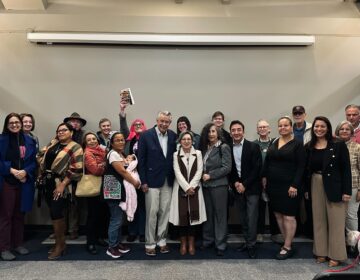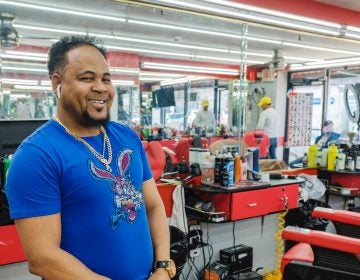How a bachata musician created the United Nations of barber shops in North Philly
Raymon Rincón owns two barber shops on North Fifth Street in Philadelphia. He is part of a strong community of business owners from the Dominican Republic.
This story is part of The 47: Historias along a bus route, a collaboration between WHYY’s PlanPhilly, Emma Restrepo and Jane M. Von Bergen.
This article is written in English. To read this article in a combination of English and Spanish, click or tap here o para leer este artículo en español, haga clic o toque aquí.
Business is good at Raymon “La Salsa” Rincón’s La Salsa barber shop on North Fifth Street.
With a bright orange sign and a warm vibe, the place is inviting — and hard to miss. Even bus drivers piloting SEPTA’s 47 bus notice Rincón’s shop as they motor by.
The bus drivers “look at the barber shop and they want to know what is here,” Rincón said.
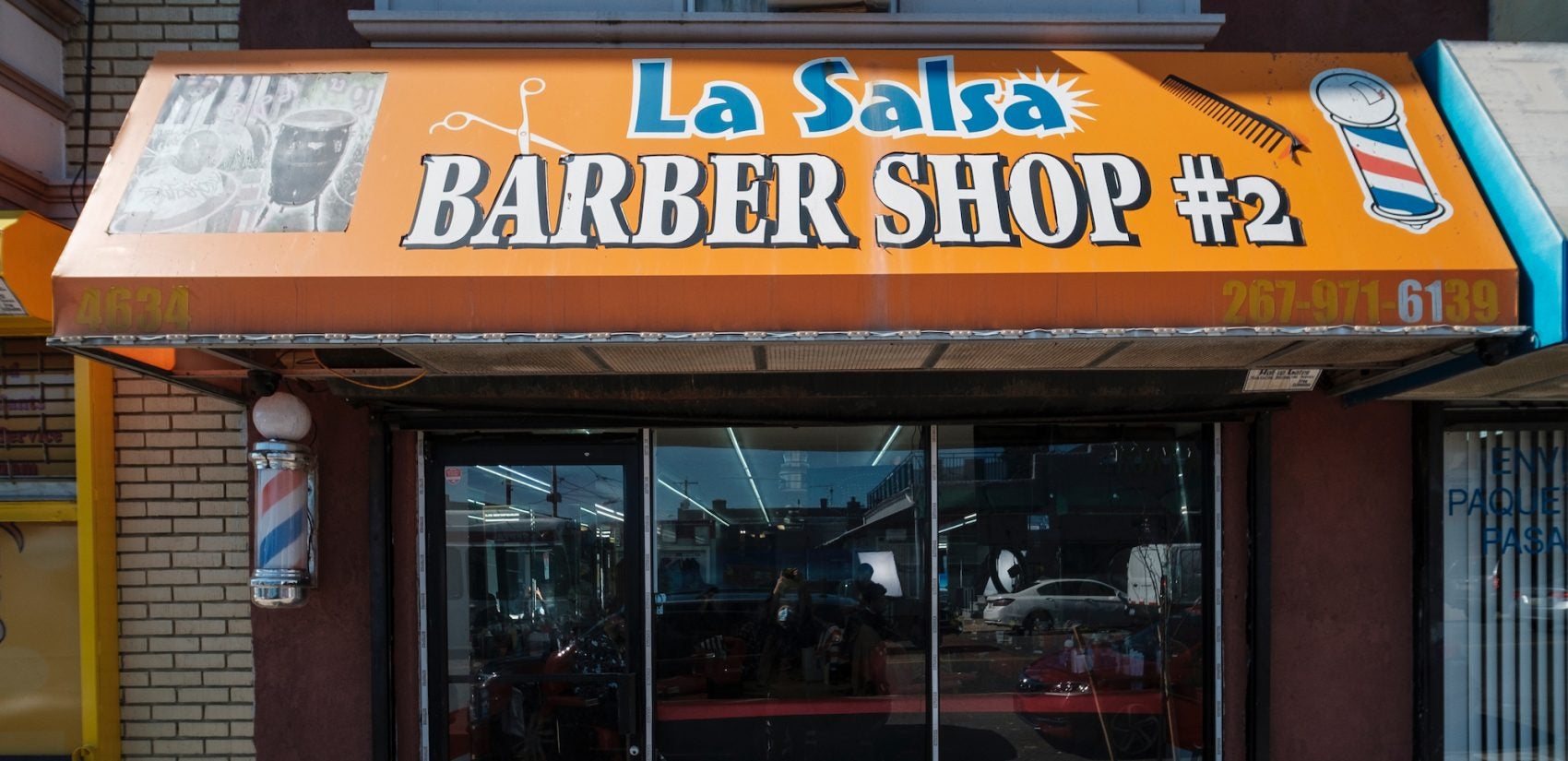
What is there is obvious through the big windows facing the street. Like many North Philly businesses, the barbershop has a Caribbean flavor. Loud, energetic music, laughter, joy, camaraderie.
“The atmosphere of a barbershop, you have to be a little … as I say… a little loving,” Rincón said. Customers can be demanding. “You have to have the patience to know how to deal with it. Those people who come like this, you treat them with affection, you treat them with love.”

The shop’s clientele reflects the neighborhood — lots of foot traffic from fellow Dominicans, like Rincón, but also other Black and Latino Philadelphians.
“Why so many people? They wanted to try. And now, they tasted the seasoning” and so they return, said Rincón who owns a second barbershop on Fifth Street, La Salsa II. “We do the job well and we treat them well.”
Rincón came to the United States on Christmas Eve, 1997. He came somewhat reluctantly — December is one of his favorite times of the year in the Dominican Republic.
But Rincón, a musician, and his fellow band members had a gig in the United States. Rincón, who plays güiro, a percussion instrument, was traveling with Willian Segura, el Vacandú, “a beautiful bachata group,” Rincón said. It was reason enough to make the trip.
First stop was Manhattan. In February, they embarked on another tour — to Europe, Puerto Rico, and then Miami before finally returning to New York.
Eventually, he found himself in Philadelphia for another music gig. He liked what he saw and eventually moved to the city, a common migration pattern for Dominicans.
“It looked like a neighborhood, a neighborhood belonging to us,” he said of his adopted home. “Philadelphia had parking, more activity and less hustle.”
When Rincón wasn’t playing, he worked in landscaping. For him, a friend’s barbershop was almost like a second home – a place to hang out, to tell stories, and make jokes.
The barbershop business began to look pretty good, especially after Rincón got laid off from his landscaping job. “Then I said to my friend, ‘Give me that chair!’” and he said, ‘Take it!’” Rincón bought a business and started cutting hair.
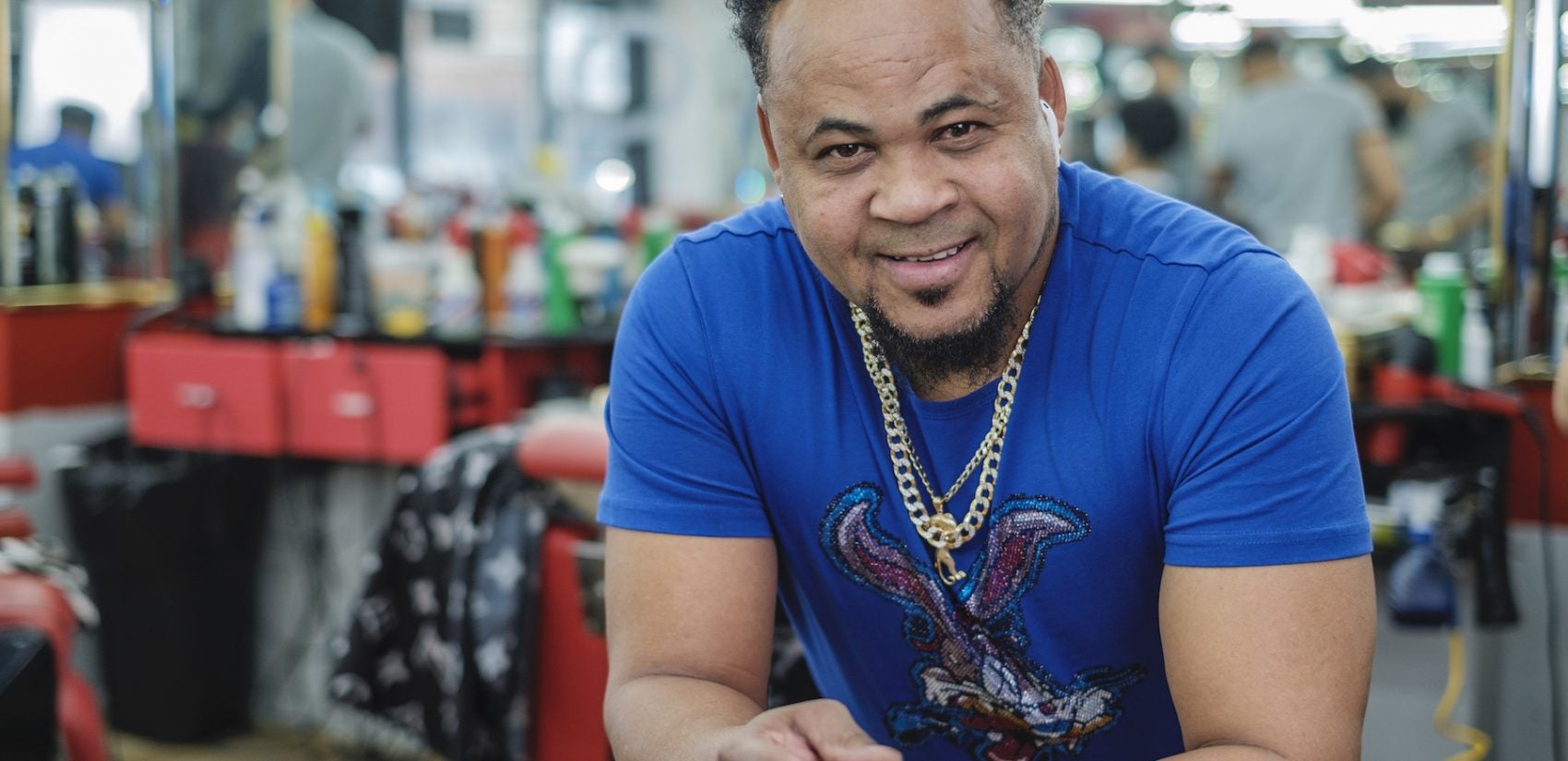
Rincón, who owns a second shop, La Salsa II a few blocks away on Fifth Street, is one of thousands of Dominican business owners in Philadelphia. Dominicans make up a large percentage of the city’s nearly 12,000 Latino entrepreneurs, according to Jennifer Rodríguez, president and chief executive of the Greater Philadelphia Hispanic Chamber of Commerce.
Second to Puerto Ricans, Dominicans constitute the second-largest group of Latinos in Philadelphia.
“The Dominican comes in with a hunger to progress,” said Rincón. “The barbershops are Dominican, the women’s salons, the bodegas – the businesses to ship stuff and send money – almost all are Dominican.”
Immigrant businesses like Rincón’s play an important part in the nation’s economy. Researchers from the Ewing Marion Kauffman Foundation, which studies entrepreneurship, estimate that immigrants tend to start new businesses at double the rate of native-born Americans.
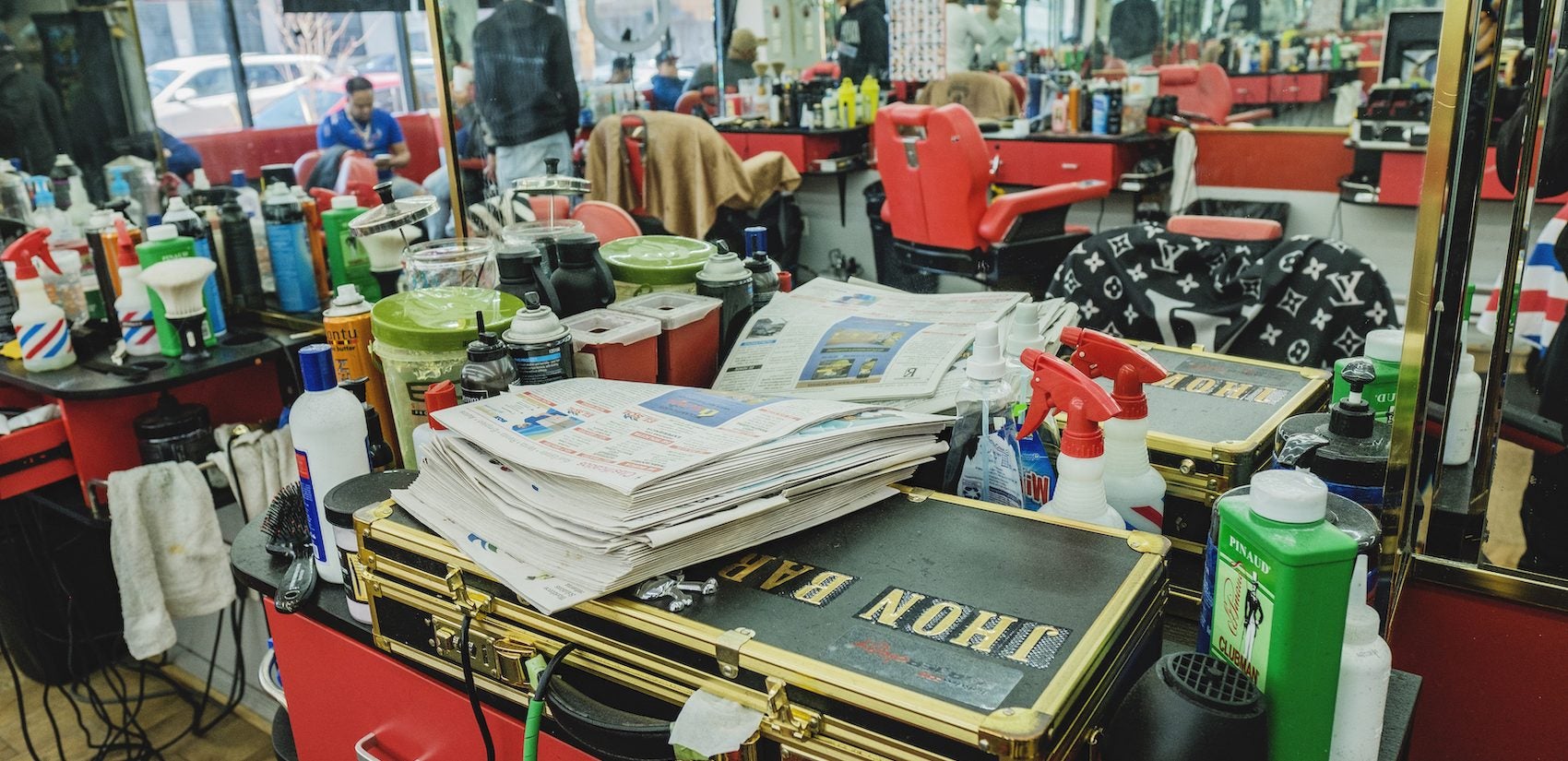
In 2017, the Center for American Entrepreneurship looked at the backgrounds of the founders of Fortune 500 companies, America’s largest businesses. The Center’s analysis showed that 43% had been started by first- or second-generation immigrants.
“Entrepreneurship is a viable and relatively effective option” for immigrants who need to generate an income, Rodríguez said. Professionals whose degrees aren’t recognized here open businesses and, “on the other side, in some cases they are immigrants with a lack of education, for whom speaking English is an obstacle.”
They open businesses that employ their skills in “their communities, where language and culture are familiar.”
“We know that Latino businesses tend to hire people from the community more often and to give second chances to people with backgrounds who would not be eligible for jobs at large corporations,” said Rodríguez.
Because, as Rodríguez explained, access to capital is a challenge for all new businesses, and particularly for immigrant businesses which may not have the connections or know-how to obtain it, entrepreneurs help each other.
That’s definitely true in Philadelphia’s Dominican community.
For example, a friend loaned Rincón part of the money to buy his first shop in 2007. “I still thank him from my soul,” Rincón said.
And in turn, he helps others.
“Of course, if you are a person who… even though you do not have papers and you do not have a social security card, there are friends who have pursued and have businesses and want other friends to [advance] … to help others. Like me, I have helped many, many people.”
It’s not always easy – barbers join him in his shop, then strike out on their own. “I say, ‘No problem. You know that I will help you.’”
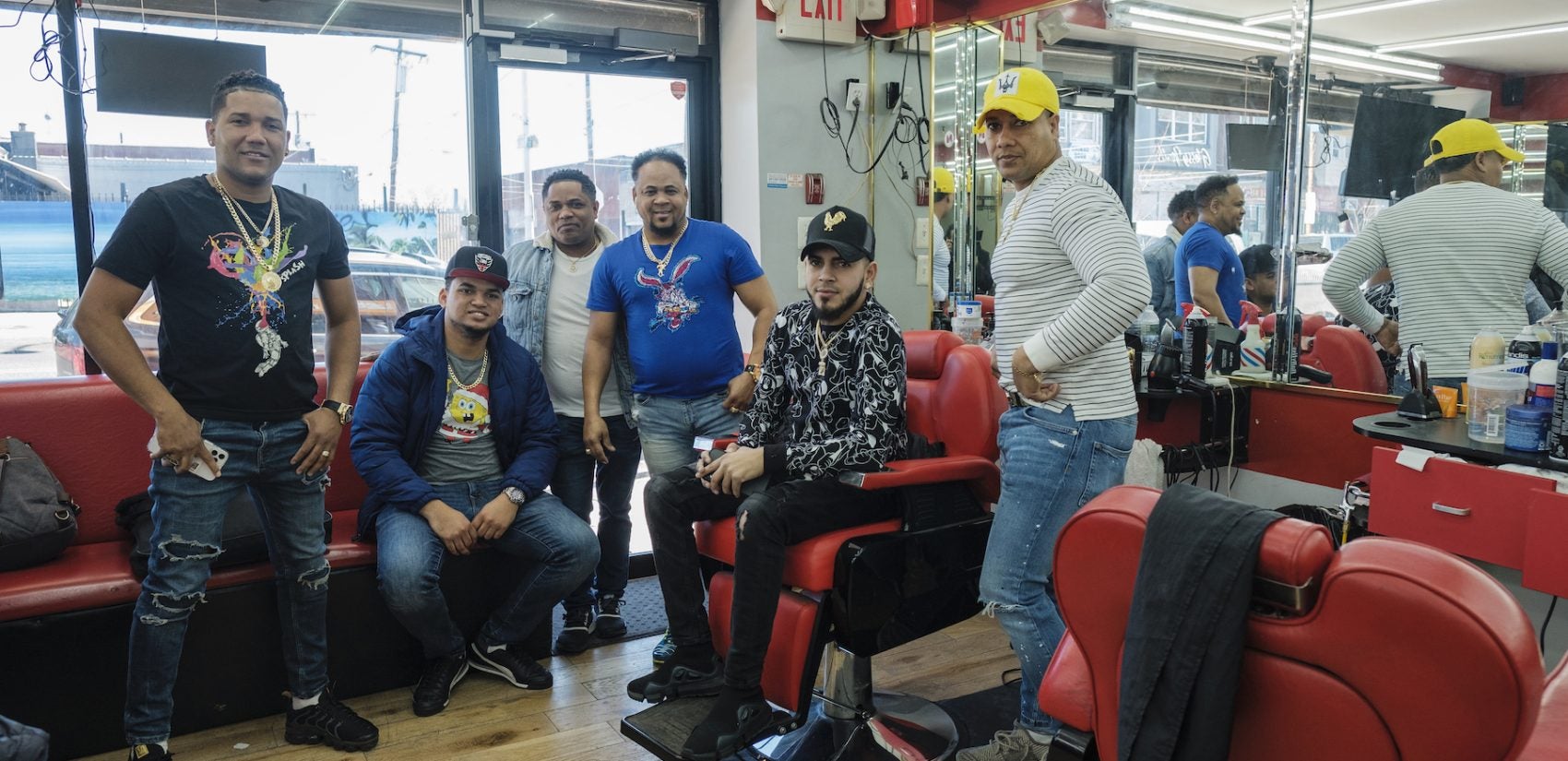
Rincón has a team of 15 young people, most of whom are also Dominicans. They know their customers very well – well enough to guess what cut they’ll want based on whether they’re from Mexico, Puerto Rico, or other parts of the Caribbean. “This barbershop is five stars,” Rincón brags. “You can check it out that we’re number one.”
The atmosphere at La Salsa is decidedly masculine, but women show up as well, bringing sons or nephews for their haircuts. “The women who come here, they are happy because no one bothers them,” Rincón says. Given the special reverence for the ladies who walk through the door, it’s no surprise that romance may follow. Caribbeans, after all, are famous for their friendliness and sweetness. But romance has to happen outside the shop.
“I’m not saying that no one can fall in love, because everyone can fall in love, but in here there’s respect,” Rincón said.
Hard work also figures into the mix.
“If you know how to work, you keep your business,” Rincón said. “Knowing how to work means coming early, cleaning, having a good face for the customer when he comes in, and doing the job that the client wants and let the customer leave happy. [That] lets the customer come back tomorrow.”
Rincón has never abandoned his music. He still dreams of touring around the world, but meanwhile, he finds contentment in his barbershops.
“Of course, my life began since I stayed in this country. Today, I am fine. I am happy. It is good in this country. I have my wife. I have my children.
I have everything. What more could you ask for?”

Subscribe to PlanPhilly
WHYY is your source for fact-based, in-depth journalism and information. As a nonprofit organization, we rely on financial support from readers like you. Please give today.



